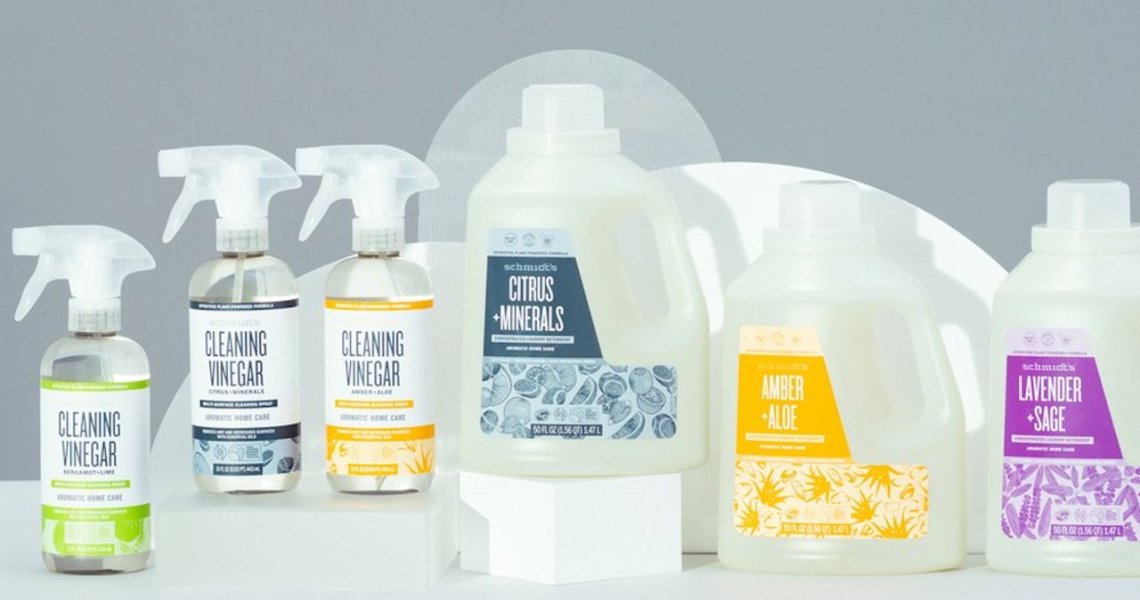As “wellness” takes over all industries, the lines between beauty and home care are blurring.
Brands from Schmidt’s and Love Beauty and Planet are making moves into products for cleaning the home, while companies like Grove Collaborative are creeping into clean beauty territory.
Earlier this month, Schmidt’s, known for its natural deodorant, soap and toothpaste products, expanded into home care with a multi-surface cleaning spray and laundry detergent, after developing the products for a little over a year. Currently, the collection is sold exclusively at Whole Foods, with plans to broaden distribution to more natural product retailers and Schmidt’s e-commerce site in the coming months.
“It’s our mission at Schmidt’s to enable small, yet effective changes toward wellness that our customers can make in their daily lives by offering products that really work, and are made with the kind of ingredients people want to be using,” said Ryu Yokoi, CEO of Schmidt’s. “We believe that home care can be a form of self-care, too.”
For Schmidt’s, a Unilever-owned brand since 2017, the shift makes a lot of sense considering Unilever’s greater push into home care. In January, Love Beauty and Planet (another Unilever-owned brand), made its move into home, launching a secondary brand called Love Home and Planet, a 38-item cruelty-free and vegan home line selling dish soap, dishwasher packets and fabric softener.
“A brand like Unilever is already working across the household category and across all the beauty categories. A big reason why big companies snap up these smaller brands is for their consumer base, so now they are able to tap into a new group of consumers by leveraging the brand equity and bringing in the existing technology from other categories and brands,” said Sarah Jindal, senior global analyst of innovation and insights at Mintel.
So far, diversifying beauty brands and focusing more on home care seems to be paying off for Unilever. In the company’s most recent earnings report for the three months ending on July 25, Unilever reported a 3.3% growth in underlying sales for its beauty and personal-care division. Home care sales grew by 7.4% from the previous year. Schmidt’s declined to share its financial goals for the new clean home line.
While the shift is taking place on the beauty side as brands look to differentiate in a crowded market, home care brands are taking a similar approach. It’s now more common to see home-focused brands shifting into clean beauty, an industry expected to be worth nearly $22 billion by 2024, according to Statista.
Ad position: web_incontent_pos1
The move calls to mind The Honest Company’s expansion. It launched a beauty brand, separate from its core home product business in September 2015. More brands are learning that in order to connect with conscious consumers who are looking to adopt healthier lifestyles, category expansion is key.
“If you care about what you put on your countertops, probably you care what you are putting on your face,” said Stuart Landesberg, co-founder and CEO of Grove Collaborative. “We started Grove in 2012 and have seen a big community of people switching from conventional products to natural products for things like hand soap, dish soap and detergent. One of the categories in which we heard customers asking for the most help in switching products [from conventional to natural] was beauty.”
In October, Grove Collaborative, an online marketplace selling healthy home essential items and personal-care products, announced its push into the clean beauty space with sub-brand Roven. The shift followed Grove Collaborative’s $150 million Series D round of funding, announced in September. The launch was driven largely by data gathered from a survey of over 100,000 customers around what beauty brands they use and their price points, and their beauty routines. Prior to introducing Roven, Grove had 2 million customers and sent 450,000 shipments per month.
“These categories fit really well because they’re both really easy spaces for us to be our best selves in, on a daily basis,” said Landesberg. In 2018 Grove Collaborative did $104 million in revenue and is on track for triple-digit growth in 2019, following the launch of Roven.




